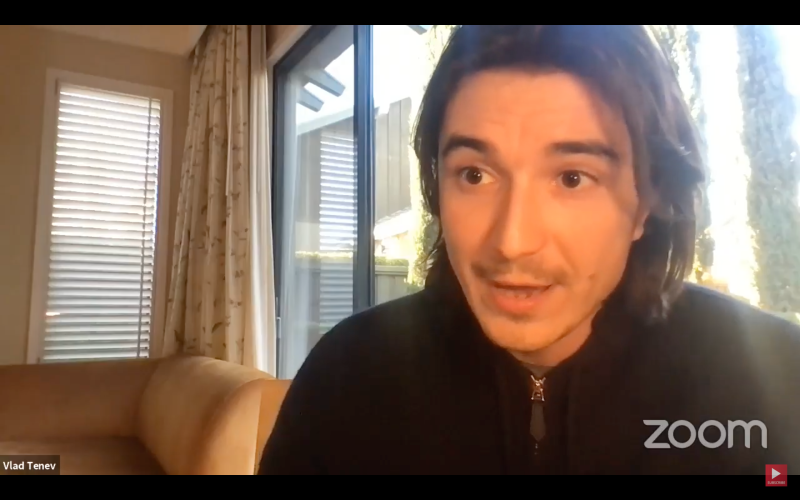In the face of uproar over Robinhood’s decisions to restrict the trading of GameStop and other volatile stocks from customers, Robinhood chief executive Vlad Tenev ’08 denied that hedge funds influenced the company’s decisions and explained how it raised a staggering $3.4 billion in 72 hours to resume trading in a Wednesday Stanford Entrepreneurial Thought Leaders (ETL) talk.
Just two weeks ago, Reddit users on the WallStreetBets forum popularized the idea of “meme stocks” and invested in GameStop shares, sending their prices surging to 2,000% more than the previous month’s. Why GameStop? The Redditors decided the stock deserved a second chance and simultaneously took the opportunity to disrupt large Wall Street hedge funds’ bets against the stock — otherwise known as short selling — causing one such fund, Melvin Capital, to need a $2.75 billion bailout.
The event has become an almost archetypal example of a struggle between everyday Americans and Wall Street, a story that Tenev thinks is too simple. Many people are not willing to research the technicalities of the matter in order to understand transactions facilitated by clearinghouses and the company’s revenue streams, such as payment for order flow, according to Tenev.
Despite his stated confidence in the legality and righteousness of Robinhood’s actions, Tenev came off at the event as a bit harried. He said maintaining a routine is important to entrepreneurship, including working out and taking care of himself physically. But his routine also includes a goal of just four hours of sleep per night, and he gets even less now with his company facing intense scrutiny.
Although he said he is “a proud alum” who is “always happy to take any opportunity to talk to students,” Tenev dodged moderator and entrepreneurship lecturer Ravi Belani’s lines of questioning on Robinhood’s $65 million settlement with the Securities and Exchange Commission (S.E.C) for misleading users. He also doubled down on defending Robinhood’s business practices, despite a class-action lawsuit and upset customers.
Tenev even has an upcoming date in Congress: along with other hedge fund executives, he is expected to testify on Capitol Hill on Feb. 18.
“When a crisis is successfully navigated by a company, it unlocks the next level of value creation,” he said. “I’m a big fan of making a series of original mistakes.”
Tenev denied the theories that the hedge fund Citadel was behind the decision to halt all trading on GameStop shares last week, a major concern that has been raised by Robinhood customers and major players in the tech industry. This includes Elon Musk, who called Tenev “Vlad the Stock Impaler.”
Tenev said the decision to restrict trading of meme stocks was one the company made in communication with its clearinghouse partners when discussing deposit requirements. Such situations are regulated by the National Securities Clearing Corporation (NSCC).
Because of the high volume of stock trades, Tenev explained, Robinhood was put into a position by NSCC regulations where it had to limit trading of stocks so that it could guarantee that its customers would be able to pay for their trades with fewer orders coming through the pipeline.
To meet the NSCC’s requirements, Robinhood raised $3.4 billion in 72 hours last week, in “what started off as a phone call to Ribbit Capital’s Micky Malka, a friend of [Tenev’s] and a huge investor in Robinhood.” This sum of money from such a short period of time is more than the company had raised in its previous eight years of existence.
Tenev said he was humbled to see how much people supported the company, describing Robinhood as “fortunate to have people lined up to offer us capital in such times, on such short notice.”
“People have a right to feel upset at Robinhood not letting them buy the stocks that they wanted to buy,” Tenev said. “If we look at the financial system that we have to operate in … we haven’t done a great job explaining it, and it really affects people’s lives in so many ways.”
He hopes the controversy will end in “more transparency and understanding by the public around how technology mixed in with finance works.” He added that Robinhood has made “tons of enhancements” to its legal team and compliance team, but “we can improve upon how we communicate the business model.”
According to Tenev, Robinhood was founded on the mission of making finance more accessible.
As a Stanford undergrad, Tenev wanted to be an academic, and met his co-founder Baiju Bhatt ’07 M.S. ’08 through taking challenging graduate-level math courses, where they bonded over late-night problem sets. After graduation, he and Bhatt “missed” working together and saw an opportunity to create new financial technology in the upheaval caused by the 2008 financial crisis — and thus Robinhood was born.
“How can we paint a future where we are using the best technology to power our financial system, and how can we actually make the American financial system the envy of the world again?” he said.
Contact Matthew Turk at mjturk ‘at’ stanford.edu and Denise Hui Jean Lee at deniselj ‘at’ stanford.edu.
